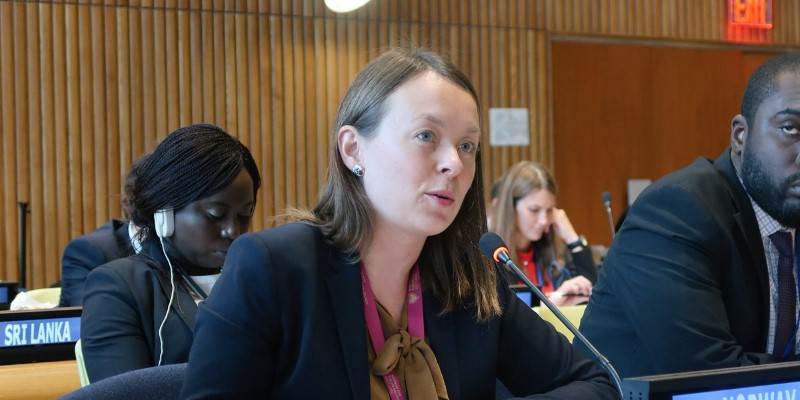Mr. President,
I have the honour to address the Sixth Committee on behalf of the Nordic countries: Denmark, Iceland, Finland, Sweden and my own country, Norway.
I take the floor in respect of the request to grant Observer Status in the General Assembly to the International Council for the Exploration of the Sea (ICES).
Norway requested the agenda item to be inscribed on the Committee’s agenda in a letter to the Secretary General dated 6 July 2018. The request was supported by all Member States of ICES.
The Resolution before you is co-sponsored by Canada, Denmark, Estonia, Finland, France, Iceland, Ireland, Netherlands, Poland, Portugal, the Russian Federation, South Africa, Sweden, the United Kingdom of Great Britain and Northern Ireland and the United States of America.
Mr. President,
ICES is an intergovernmental organization that coordinates and promotes marine research on oceanography, the marine environment, marine ecosystems and on living marine resources from the Arctic Ocean through the North Atlantic. The adjacent sea areas include European seas, the Mediterranean Sea and the Black Sea, including the North Pacific, and the southern hemisphere.
ICES is a global network of more than 5000 scientists from almost 700 institutes, representing close to 60 countries, adding precious value to national research efforts in all regions of the world. Members of the ICES community include all states bordering the North Atlantic and the Baltic Sea, with affiliate institutes in in Africa, South America, and Oceania. Through strategic partnerships, the work of ICES also extends into the Arctic, the Mediterranean Sea, the Black Sea, and the North Pacific Ocean.
Let me stress that science is the foundation on which integrated and successful environmental marine policies are built to achieve agreed objectives. ICES can contribute within its remit to promote marine research, particularly in relation to living resources and marine ecosystems. ICES works at the science-policy interface, providing the best available science to sustainable management. The science is carried out in a way that is transparent and auditable, covering areas from the regional to the global level.
Mr. President,
Let me further inform you that ICES has already established formal cooperation agreements with the Intergovernmental Oceanographic Commission of UNESCO (IOC/UNESCO) and the Food and Agriculture Organization of the United Nations (FAO). Given the international character of marine research, and through strategic partnerships, the work of ICES is applicable on a global scale.
As an observer of the UN General Assembly, ICES will be ready to contribute and engage actively in relevant work of the United Nations. This includes inter alia achieving the Sustainable Development Goals, in addition to contributing to the UN Decade of Ocean Science for Sustainable Development, the UN Open-ended Informal Consultative Process in Oceans and the Law of the Sea, and the Regular Process for Global Reporting and Assessment of the State of the Marine Environment, including Socioeconomic Aspects.
This underscores that the UN and ICES have complimentary goals and objectives.
Mr. President,
Furthermore, ICES thus fully fulfils the criteria and formalities laid down in UNGA s decision 49/426 of December 1994 which stresses that observer status “should in the future be confined to States and to those intergovernmental organizations whose activities cover matters of interest to the Assembly.”
Through observer status in the General Assembly ICES may ensure its work continues to support and contribute to the implementation of internationally agreed policy goals and thus, we trust that ICES merits to be granted Observer Status to the UN General Assembly in accordance with UNGA decision 49/426 of December 1994.
Thank you, Mr. President
